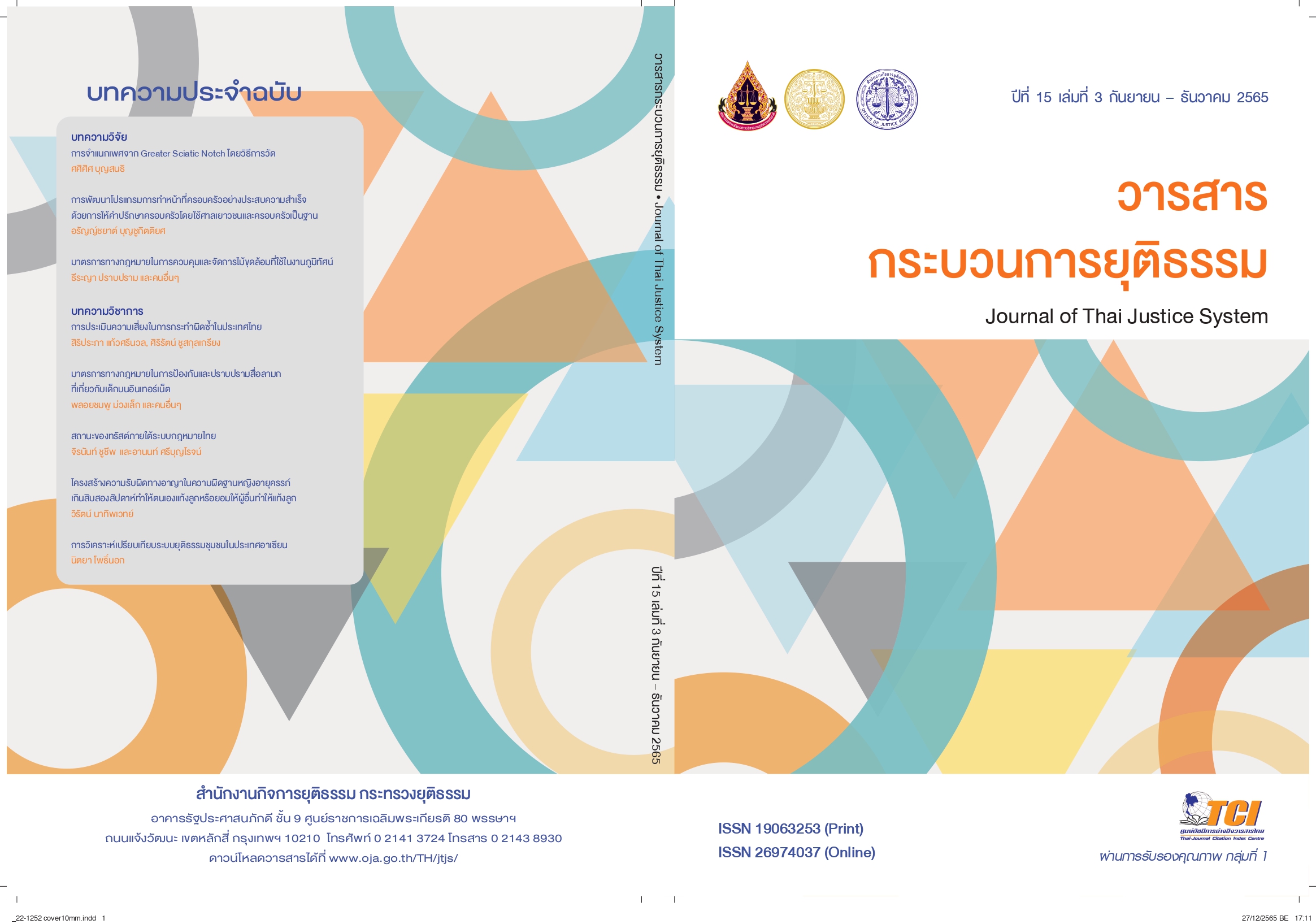โครงสร้างความรับผิดทางอาญาในความผิดฐานหญิงอายุครรภ์เกินสิบสองสัปดาห์ทำให้ตนเองแท้งลูกหรือยอมให้ผู้อื่นทำให้แท้งลูก
Main Article Content
บทคัดย่อ
บทความวิชาการฉบับนี้มีวัตถุประสงค์เพื่ออธิบายความรับผิดทางอาญาในความผิดฐานหญิงอายุครรภ์เกินสิบสองสัปดาห์ทำให้ตนเองแท้งลูกหรือยอมให้ผู้อื่นทำให้แท้งลูกตามประมวลกฎหมายอาญา มาตรา 301 โดยผู้เขียนนำโครงสร้างความรับผิดทางอาญามาเป็นเครื่องมือในการอธิบาย จากการศึกษาพบว่า ประการที่หนึ่งประมวลกฎหมายอาญามาตรา 301 ลงโทษเฉพาะหญิงมีอายุครรภ์เกิน 12 สัปดาห์เท่านั้น กฎหมายไม่ได้กำหนดเงื่อนไขของการยุติการตั้งครรภ์แต่อย่างใดว่าหญิงที่มีอายุครรภ์ไม่เกิน 12 สัปดาห์ต้องอยู่ในความดูแลและให้คำปรึกษาของผู้ประกอบวิชาชีพเวชกรรม ประกอบกับข้อมูลของกรมอนามัย สำนักอนามัยการเจริญพันธุ์ ในปี 2562 พบว่า อัตราการคลอดแบบมีชีพเด็กในช่วงวัย 10 ถึง 14 ปี เท่ากับ 1.1 ต่อ 1 พันคน และอัตราการคลอดแบบมีชีพของหญิงอายุ 15-19 ปี เท่ากับ 31.3 ต่อ 1 พันคน ดังนั้น การยุติการตั้งครรภ์ของเด็กที่ยังไม่บรลุนิติภาวะนั้น เมื่อกฎหมายเปิดกว้างให้สามารถทำแท้งได้ด้วยตนเองโดยไม่ต้องอยู่ในความดูแลและให้คำปรึกษาของผู้ประกอบวิชาชีพเวชกรรม อาจทำให้เด็กเป็นอันตรายจากการยุติการตั้งครรภ์ หรือเด็กเลือกใช้บริการคลินิกเถื่อนได้ ประการที่สอง ประมวลกฎหมายอาญามาตรา 305 เป็นกฎหมายที่ยกเว้นความผิดให้กับหญิงมีครรภ์ที่มีอายุครรภ์เกิน 12 สัปดาห์ และผู้ประกอบวิชาชีพเวชกรรม รวมถึงผู้ที่ทำภายใต้การดูแลของผู้ประกอบวิชาชีพเวชกรรมด้วย ทั้งนี้ ต้องอาศัยข้อบังคับแพทยสภาว่าด้วยหลักเกณฑ์เกี่ยวกับการยุติการตั้งครรภ์ทางการแพทย์ของผู้ประกอบวิชาชีพเวชกรรมตามมาตรา 305 แห่งประมวลกฎหมายอาญา พ.ศ. 2564 ทั้งนี้ ตามข้อ 5 ของข้อบังคับ แพทยสภาฯ ดังกล่าว การยุติการตั้งครรภ์ในหญิงซึ่งอยู่ในสภาวะที่เกี่ยวข้องกับความผิดปกติทางด้านร่างกายหรือจิตใจที่ไม่สามารถตัดสินใจได้ด้วยตนเอง ต้องได้รับความยินยอมจากผู้แทนโดยชอบด้วยกฎหมาย หรือผู้ปกครองดูแล การที่ข้อบังคับแพทยสภาฯ กำหนดให้ผู้ประกอบวิชาชีพเวชกรรมเป็นผู้ตัดสินใจในการยุติการตั้งครรภ์เพื่อประโยชน์สูงสุดของหญิง ในกรณีผู้แทนโดยชอบด้วยกฎหมาย หรือผู้ปกครองดูแล ไม่ให้ความยินยอมโดยไม่มีเหตุอันสมควร หรือมีประโยชน์ขัดกันกับหญิง ซึ่งโดยหลักแล้วสิทธิในการตัดสินใจยุติการตั้งครรภ์เป็นสิทธิของหญิงโดยแท้ ประกอบกับเงื่อนไขในการยุติการตั้งครรภ์โดยชอบด้วยกฎหมายตามประมวลกฎหมายอาญา มาตรา 305 (1) เป็นกรณีที่จำต้องกระทำเนื่องจากหากหญิงตั้งครรภ์ต่อไปจะเสี่ยงต่อการได้รับอันตรายต่อสุขภาพกาย หรือจิตใจของหญิงนั้น และ ประมวลกฎหมายอาญา มาตรา 305 (2) จำเป็นต้องกระทำเนื่องจากมีความเสี่ยงอย่างมากหรือมีเหตุผลทางการแพทย์อันควรเชื่อได้ว่า หากทารกคลอดออกมาจะมีความผิดปกติถึงทุพพลภาพอย่างร้ายแรง ดังนั้น กฎหมายควรให้ผู้ประกอบวิชาชีพตัดสินตัดสินใจเฉพาะกรณีจำเป็นเร่งด่วนที่เกี่ยวข้องกับสุขภาพของหญิงเท่านั้น ซึ่งหากไม่ยุติการตั้งครรภ์โดยเร็วจะทำให้หญิงมีครรภ์ถึงแก่ชีวิต หรือได้รับอันตรายสาหัส ส่วนกรณีที่ไม่จำเป็นเร่งด่วน ไม่ถึงขนาดที่หากไม่ยุติการตั้งครรภ์โดยเร็วจะทำให้หญิงมีครรภ์ถึงแก่ชีวิต หรือได้รับอันตรายสาหัส หรือ กรณีตามประมวลกฎหมายอาญา มาตรา 305 (2) การยุติการตั้งครรภ์ดังกล่าวนี้ ควรมีมาตรการทางกฎหมายให้ศาลเป็นคนกลางในการตัดสินใจ โดยถือเอาคำพิพากษาของศาลแทนการแสดงเจตนาเพื่อให้ก่อประโยชน์สูงสุดแก่หญิงมากที่สุด และเพื่อแก้ปัญหาการโต้แย้งในภายหลังหากหญิงที่ตั้งครรภ์หายจากภาวะผิดปกติทางด้านร่างกายหรือจิตใจที่ไม่สามารถตัดสินใจได้ด้วยตนเองโต้แย้งว่าผู้ประกอบวิชาชีพเวชกรรมทำการยุติการตั้งครรภ์โดยไม่ได้รับความยินยอมจากตน
Article Details

อนุญาตภายใต้เงื่อนไข Creative Commons Attribution-NonCommercial-NoDerivatives 4.0 International License.
ต้นฉบับที่ได้รับการตีพิมพ์ในวารสาร เป็นลิขสิทธิ์ของวารสารกระบวนการยุติธรรม แต่ความคิดเห็นที่ปรากฏในเนื้อหาของบทความในวารสารกระบวนการยุติธรรม ถือเป็นความรับผิดชอบของผู้เขียนแต่เพียงผู้เดียว
เอกสารอ้างอิง
กรกฎ ทองขะโชค. (2560). กฎหมายอาญา บทบัญญัติทั่วไป (พิมพ์ครั้งที่ 2). สงขลา: นำศิลป์โฆษณา.
กรมอนามัย, สำนักอนามัยการเจริญพันธุ์. (2562). รายงานเฝ้าระวังการแท้งประเทศไทย พ.ศ. 2562. ค้นเมื่อ 21 ธันวาคม 2565, จาก https://rh.anamai.moph.go.th/webupload/migrated/files/rh/n330_da80b22d8a4daa876f459095915af6d_Ebook_Abortion_62.pdf
กระทรวงสาธารณสุข, กรมสุขภาพจิต, สำนักบริหารระบบบริการสุขภาพจิต. (2560). คู่มือการดูแลผู้ป่วยโรคจิตเภทสำหรับโรงพยาบาลในเขตสุขภาพ (ฉบับแพทย์) (พิมพ์ครั้งที่ 2). นนทบุรี: ผู้แต่ง.
เกรียงไกร เจริญธนาวัฒน์. (2561). หลักพื้นฐานกฎหมายมหาชน (พิมพ์ครั้งที่ 4). กรุงเทพฯ: สำนักพิมพ์วิญญูชน.
เกียรติขจร วัจนะสวัสดิ์. (2562). คำอธิบายกฎหมายอาญา ภาค 1 เล่ม 1 (พิมพ์ครั้งที่ 11). กรุงเทพฯ: กรุงสยาม พับลิชชิ่ง.
ไกรฤกษ์ เกษมสันต์. (2559). คำอธิบายประมวลกฎหมายอาญา ภาคความผิด มาตรา 288-มาตรา 366 (พิมพ์ครั้งที่ 10). กรุงเทพฯ: สำนักอบรมศึกษากฎหมายแห่งเนติบัณฑิตยสภา.
คณพล จันทน์หอม. (2563). หลักพื้นฐานกฎหมายอาญา เล่ม 1. กรุงเทพฯ: สำนักพิมพ์วิญญูชน.
คณพล จันทน์หอม. (2564). คำอธิบายกฎหมายอาญาภาคความผิด เล่ม 2 (พิมพ์ครั้งที่ 6). กรุงเทพฯ: สำนักพิมพ์วิญญูชน.
คณิต ณ นคร. (2545). กฎหมายอาญาภาคความผิด (พิมพ์ครั้งที่ 8). กรุงเทพฯ: สำนักพิมพ์วิญญูชน.
คณิต ณ นคร. (2563). กฎหมายอาญาภาคทั่วไป (พิมพ์ครั้งที่ 7). กรุงเทพฯ: สำนักพิมพ์วิญญูชน.
จรัญ โฆษณานันท์. (2559). สิทธิมนุษยชนไร้พรมแดน : ปรัชญา กฎหมาย และความเป็นจริงทางสังคม (พิมพ์ครั้งที่ 3). กรุงเทพฯ: สำนักพิมพ์นิติธรรม.
จิตติ ติงศภัทิย์. (2555). กฎหมายอาญา ภาค 1 (พิมพ์ครั้งที่ 11). กรุงเทพฯ: เนติบัณฑิตยสภา.
ต่อพงศ์ กิตติยานุพงศ์. (2562). ทฤษฎีสิทธิขั้นพื้นฐาน (พิมพ์ครั้งที่ 2). กรุงเทพฯ: สำนักพิมพ์วิญญูชน.
ทวีเกียรติ มีนะกนิษฐ และรณกรณ์ บุญมี. (2564ก). กฎหมายอาญา ภาคทั่วไป (พิมพ์ครั้งที่ 22). กรุงเทพฯ: สำนักพิมพ์วิญญูชน.
ทวีเกียรติ มีนะกนิษฐ และรณกรณ์ บุญมี. (2564ข). คำอธิบายกฎหมายอาญา ภาคความผิดและลหุโทษ (พิมพ์ครั้งที่ 18). กรุงเทพฯ : สำนักพิมพ์วิญญูชน.
นิมิต ชิณเครือ. (2559). กฎหมายแพ่ง (พิมพ์ครั้งที่2). กรุงเทพฯ: สำนักพิมพ์รามคำแหง.
ปกป้อง ศรีสนิท. (2559). กฎหมายอาญาชั้นสูง. กรุงเทพฯ: สำนักพิมพ์วิญญูชน.
ปกป้อง ศรีสนิท. (2563). สิทธิมนุษชนในกระบวนการยุติธรรมทางอาญา (พิมพ์ครั้งที่1). กรุงเทพฯ: สำนักพิมพ์ วิญญูชน.
ปฏิพล สันธนาคร. (2554). การศึกษาเปรียบเทียบประสิทธิผลของยาไมโสพรอสตอล ขนาด 400 และ 600 ไมโครกรัมเหน็บทางช่องคลอดในการยุติการตั้งครรภ์ที่อายุครรภ์น้อยกว่า 20 สัปดาห์ ในโรงพยาบาลศรีสะเกษ. วารสารการแพทย์ โรงพยาบาลศรีสะเกษ สุรินทร์ บุรีรัมย์, 26(2), 230-131.
ผู้จัดการออนไลน์. (2564). สภารับหลักการร่างแก้ไข ป.อาญาฯ เด็กอายุต่ำกว่า 12 ปี ไม่ต้องรับโทษ. ค้นเมื่อ 22 มีนาคม 2565, จาก https://mgronline.com/politics/detail/9640000091493
รัชดาภรณ์ ใจอ้าย. (ม.ป.ป.). เอกสารประกอบการสอนรายวิชา 619252 การพยาบาลสุขภาพจิตและจิตเวช 2 เรื่องการพยาบาลผู้ที่มีปัญหาทางจิตเวชด้านความคิดและการรับรู้. ค้นเมื่อ 23 ธันวาคม 2564, จาก
http://sutir.sut.ac.th:8080/sutir/bitstream/123456789/4894/1/42.pdf
รุ่งศรี แสงแก้วศรี. (2552). ประสิทธิภาพการจัดการกับอาการหูแว่วของผู้ป่วยโรคจิตเภทในจังหวัดพิษณุโลก.วารสารพยาบาลศาสตร์ 3(1), 18-33.
ลักษณวัต ปาละรัตน์. (2553). ปรัชญาภาวะสตรี. กรุงเทพฯ: สำนักพิมพ์มหาวิทยาลัยรามคำแหง.
วรมน รามางกูล. (2564). แนวคิดและความเป็นมาของกฎหมายเกี่ยวกับการยุติการตั้งครรภ์ในประเทศไทย. วารสารดุลพาห, 68(1), 1-34.
วินัย ล้ำเลิศ. (2557). กฎหมายอาญา 1 (พิมพ์ครั้งที่ 4). กรุงเทพฯ: สำนักพิมพ์มหาวิทยาลัยรามคำแหง.
วิรัตน์ นาทิพเวทย์. (2564). ความรับผิดทางอาญาและกระบวนการยุติการตั้งครรภ์แทนในกรณีหญิงที่รับตั้งครรภ์แทน. วารสารกระบวนการยุติธรรม, 14(2), 37-56
วิบูลพรรณ ฐิตะดิลก และพชร ศรีปน. (2564). จากข้อบังคับแพทยสภาสู่การปฏิบัติข้อบังคับแพทยสภาว่าด้วยหลักเกณฑ์การปฏิบัติเกี่ยวกับการยุติการตั้งครรภ์ทางการแพทย์ฉบับใหม่ตามมาตรา 305 แห่งประมวลกฎหมายอาญา 2564. ค้นเมื่อ 21 ธันวาคม 2564, จาก https://tmc.or.th/Media/media-2021-08-20-10-53-06.pdf
วิสูตร ฟองศิริไพบูลย์. (2551). แพทย์ยุติการตั้งครรภ์ (ทำแท้ง) ให้กับหญิงภายใต้เงื่อนไขที่แพทยสภากำหนด: กฎเกณฑ์ทันยุคที่แพทย์ไทยทุกคนต้องรู้. วารสารเวชบันทึกศิริราช, 1(2), 114-123.
วิณัฏฐา แสงสุข และฐิติพร ลิ้มแหลมทอง. (2557). ความรู้เบื้องต้นเกี่ยวกับกฎหมายทั่วไป (พิมพ์ครั้งที่4). กรุงเทพฯ: สำนักพิมพ์มหาวิทยาลัยรามคำแหง.
ศาลฎีกา. (ม.ป.ป.). ระบบสืบค้นคำพิพากษา คำสั่งคำร้องและคำวินิจฉัยศาลฎีกา. ค้นเมื่อ 28 ธันวาคม 2564, จาก http://deka.supremecourt.or.th/search
สุภัชลี เทพหัสดิน ณ อยุธยา. (2556). โครงสร้างความรับผิดอาญา : ศึกษากระบวนการคิดของกฎหมายอาญาเยอรมันเพื่อปรับใช้กับกฎหมายอาญาไทย. วารสารธรรมศาสตร์, 32(3), 40-73.
สรวุฒิ เกษมสุข และวรรณวิภา เมืองถ้ำ. (2562). ความผิดปกติทางจิตในกฎหมายอาญา : ศึกษาเฉพาะคำศัพท์ นิยาม และการตีความทางกฎหมาย. วารสารกฎหมายสุขภาพและสาธารณสุข, 5(1), 41-55.
หยุด แสงอุทัย. (2556). กฎหมายอาญา ภาค 2-3 (พิมพ์ครั้งที่ 11). กรุงเทพฯ: สำนักพิมพ์มหาวิทยาลัยธรรมศาสตร์.
หยุด แสงอุทัย. (2561). คำอธิบายกฎหมายลักษณะอาญา ร.ศ. 127 (พิมพ์ครั้งที่ 7). กรุงเทพฯ: สำนักพิมพ์วิญญูชน.


